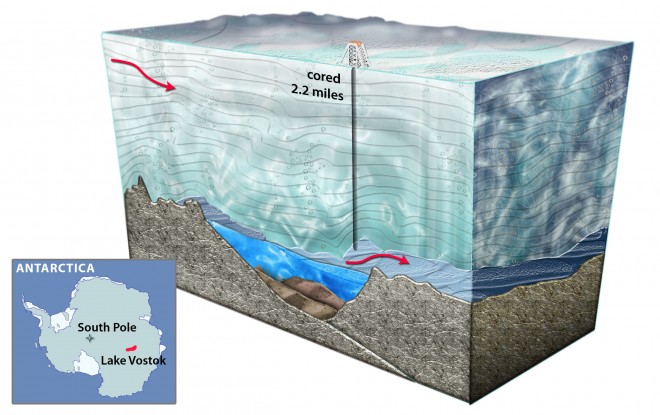Science News
Reaching Lake Vostok

While we were waking up Sunday morning, preparing for a cozy day of football, Russian scientists, freezing their butts off in Antarctica, made scientific history.
Or so news reports confirm today.
On February 5, the bundled-up researchers finally reached Lake Vostok, two miles under ice in the middle of the East Antarctic ice sheet. The team has been drilling each Antarctic summer for 14 years to penetrate the large lake, estimated to be the size of Lake Ontario.
Scientists first discovered Lake Vostok in the 1990s, and they believe it has been under ice for at least 15 million years! Imagine what this hidden lake may hold, says Scientific American:
Devoid of light but likely bursting with supersaturated oxygen and other gases, Vostok has long been speculated to be a potential habitat for unique ecosystems of extremophilic microbial life (and who knows what else).
And Wired takes it a step further:
The conditions in Lake Vostok are thought to be similar to the conditions on Jupiter’s moon Europa and Saturn’s tiny moon Enceladus.
But New Scientist spreads some doubt:
…air has accumulated in the lake for millennia, boosting the oxygen concentrations in the water and creating a potentially toxic environment. Some say that as a result, it is likely that the lake is completely sterile.
The work is tricky. In addition to dealing with the harsh weather conditions, the scientists are working hard to not contaminate the untouched waters of Lake Vostok. According to the New York Times, the Russian team’s plan
… was to plug the bottom of the bore hole with an inert fluid, Freon, and to drill the final distance with a heated drill tip instead of a motorized drill. Enough kerosene would be removed to lessen the pressure in the bore hole so that when the lake was reached, lake water would flow up the bore hole, then freezing and forming an icy plug.
As the temperatures begin to drop in one of the coldest places on Earth, the Russian team will pack up to go home, returning to Lake Vostok next December to begin the real scientific work. Will they find life?
Image: NSF